Hope, Dread, Worry, Engagement: Students and Staff Weigh In on the Election
As early voting surges throughout the country, students and staff share their thoughts on this year’s presidential election.
October 28, 2020
While the majority of the student body is not of voting age, La Salle students from freshmen to seniors have been thinking, talking, listening, and reading about the upcoming presidential election and the events around it as Nov. 3 draws closer.
Heading into the election, members of the La Salle community have various concerns for the country, and differing perspectives as to which way the elected candidate should direct his attention once inaugurated.
Among twelve students and staff interviewed, nine topics emerged as the most prevalent areas of concern for these individuals: the pandemic, climate change, healthcare, unemployment, the wealth gap, racial justice and police brutality, federal debt, upholding the Constitution, and political division.
As to who will win the election, predictions vary, with some individuals believing that Trump will gain another term in office, and others foreseeing that he will be overcome by Biden.
“I think Biden will win, honestly, just because of how Trump handled the pandemic,” senior Pel Marks-Bienen said. “It’s going to be close. I don’t think it’ll be a landslide victory at all, and I could still see a possibility of him winning, based on the electoral college. I don’t think he’ll win the popular vote.”
Senior Daniel Fuchs agreed in predicting that Trump will not win the popular vote, because “he’s too abrasive,” he said. However, Fuchs does think that Trump will be re-elected.
“It could go either way, but if I had to say it, I’d probably say Trump would win by a little bit,” Fuchs said. “Not by much.”
Fuchs said that he feels “a little nervous” for the outcome of the election, and sophomore Megan Snyder and math teacher Ms. Caitlin Hoemmen voiced similar sentiments.
“I’m feeling nervous, in that I hope that everyone who wants to vote is able to in some format,” Ms. Hoemmen said.
Snyder also expressed the importance of voting, as well as nerves around what will occur after the results of the election are announced.
“I think that it’s just really important for everybody who can vote to vote, because I know that there’s a lot of voter suppression issues going on,” Snyder said. “I’m kind of nervous for how it will turn out, and also for the aftermath of it, because I know people will be angry on either side. So hopefully not too much conflict occurs afterwards.”
Religious studies teacher Mr. Ryan Darmody, meanwhile, feels “hopeful,” he said, “in the sense that there are so many people motivated to vote.”
“I know that it’s easy to focus on a lot of the animosity, and I’m certainly not just trying to put a rosy, shiny, happy look on something that is contentious,” Mr. Darmody said. “But I’m hopeful in that people are motivated. I’ve seen a lot of statistics lately about how there are… so many votes already submitted.”
As reported by The New York Times, around 70 million Americans had already cast ballots by Tuesday, Oct. 27, a figure that is tantamount to more than half of the overall voter turnout in 2016.
According to the Associated Press, this “avalanche” of early voting has experts predicting that voter turnout rates this year could be higher than in any other presidential election since 1908.
“So many people voting tells us that there is a special weight to [this election], because so many more people are so much more interested in voting than they have been in the past,” Mr. Darmody said. “There’s certainly a weight to it that I have not experienced before.”
Despite this, Mr. Darmody said that he does not feel that “the soul of our country hangs in the balance” of this election.
“It’s hard for me to even begin to imagine this could be the ruin of our country if the election goes one way or another,” he said. “I don’t have that much hopelessness for either side of the election.”
Senior Patrick Raschio shared similar thoughts, saying that while this is an important election, “we shouldn’t see it as a ‘the-end-of-the-country’ kind of election,” he said.
“I feel like the news media has made it seem like this ‘do or die’ for our country,” Raschio said. “But in all reality, it’s just four years, no one’s going to burn the country down in four years just because they’re elected.”
In contrast, Marks-Bienen said that he feels that this is “one of the most important elections in our history.”
“If Trump gets elected, I don’t see how our country is going to move forward in any way,” he said. “In terms of the pandemic, I think we’ll be completely screwed… The list is so long, of stuff that he’s messed up, that I think another four years can be really detrimental. And that’s become a very politicized thing to say; people hear that and call you a radical liberal, radical leftist, but I really don’t think that’s radical at all.”
“I just think another four more years of him would be very detrimental to a lot of what America is upheld as by the world,” Marks-Bienen said. “And the standard we hold ourselves to in terms of democracy could definitely be threatened with another four years of Trump.”
Fuchs said that he feels that it is “hyperbolic or alarmist” to say that this is the most important election in American history, though “there’s no denying” the importance of elections in general, he said.
“A lot of people say that Donald Trump’s a tyrant or he’s going to take away your democracy,” Fuchs said. “They said that in the 2016 election, and low and behold, Donald Trump got elected and the democracy still stands. It’s not like he’s an authoritarian. And while I disagree with Joe Biden on a lot of policy, if Joe Biden got elected, it’s not the end of the world, it’s not going to destroy America, the end of the republic isn’t going to happen.”
Sophomore Maia Gutmann said that to her, it feels “clear” that Biden should be elected over Trump, as she is concerned about Trump’s handling of the coronavirus, as well as his stance on climate change.
“We need a new leader, we need someone who is really going to take responsibility,” Gutmann said. “I think that someone needs to be in office that will address [climate change] and that will acknowledge its presence so that something can happen… We’re running out of time, and if we have four more years with Trump in office, our country is so done.”
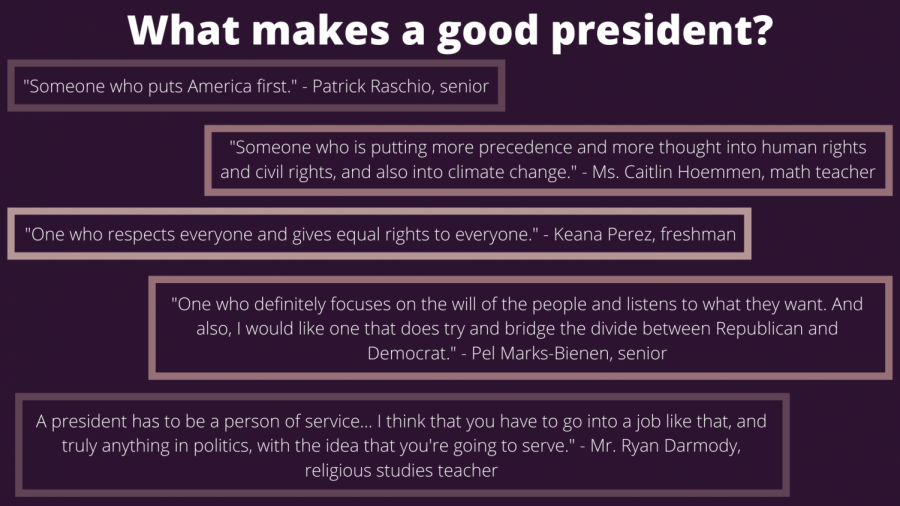
Freshman Keana Perez also feels that Trump should not be re-elected, putting emphasis on social justice.
“I feel like we need some changes right away,” Perez said. “To have respect and equality for everyone.”
Similar to Gutmann and Perez, Snyder supports Biden because of his positions on climate change and human rights.
“I think compared to President Trump, he has a much better plan and listens to the science behind it and is really well informed,” Snyder said. “I like how he has plans in place for clean energy and new jobs revolving around it, so I think that’s a really smart way to go.”
In contrast, freshman Kaden Nguyen feels that Biden does not have a strong plan, and favors Trump for his assertiveness. Raschio, who said that Trump has “done a lot of great things for our country,” feels similarly to Nguyen, specifically citing tax cuts and economic progression as areas in which Trump has succeeded during his term in office.
“Democrats’ strategy, their plan is just, ‘Trump is bad,’” Nguyen said. “That’s their whole entire plan… Even if Trump is a bad person and everything, I like the fact that he’s a person that just gets things done. Puts America first, not other people.”
Raschio said that many people “don’t really see who Trump is,” and that he is a “great president” whose image is distorted by the media.
“I feel like the media shows him as this racist, homophobic, and all these different labels on him, which really aren’t true,” Raschio said. “They just keep pushing it, so people start thinking it’s true because they take things out of context… Taking things out of context can skew the way we look at people.”
When asked about the supposed labels that have been attributed to Trump, and whether he has in fact exhibited any acts of racism or homophobia, Raschio said, “I don’t think he has.”
“Maybe in the past, but so have all of the other presidential candidates, like Joe Biden and everything,” Raschio said. “But he’s not that kind of person. Even though he said stuff in the past, doesn’t mean that’s who he is now. He cares about everybody, regardless of the color of your skin, and that’s how I think we should see each other. It’s just people. Not black, white, or gay, straight, it shouldn’t matter what you are. It should just be people.”
Fuchs supports Trump because of his policies, but dislikes the way that Trump carries himself and some of the comments that he has made. Since Fuchs favors a smaller government, he supports Trump’s agenda for economic deregulation and said that “a lot of his policy has been pretty good.”
However, “I don’t like a lot of what [Trump] said,” Fuchs said. “I think a lot of what he said is just terrible. It doesn’t help him, it makes him look like an idiot, it makes him look like a fool… What he says, it’s embarrassing sometimes.”
Gutmann expressed a similar idea of embarrassment to describe Trump’s term in office.
“I think that it’s an embarrassment to the country, personally,” Gutmann said. “I just think that throughout the four years, we have lost everything that Obama had gained for us. He has pulled us from the Paris Accord, he has set us back in virtually as many ways as possible that Obama had put us forward… So many good things that Obama did for the country, Trump has essentially just wiped those away or completely turned them around.”
Fuchs said that he appreciates Trump’s policies and values leadership that “gets things done,” but also leadership that looks to understand and negotiate with other points of view.
“I would say a good president is somebody who’s willing to get things done, but is also willing to compromise, because sometimes in order to get things done you have to compromise,” Fuchs said. “I think the president should act presidential, should act like he leads a country. He shouldn’t throw silly, petty quips at his opponents.”
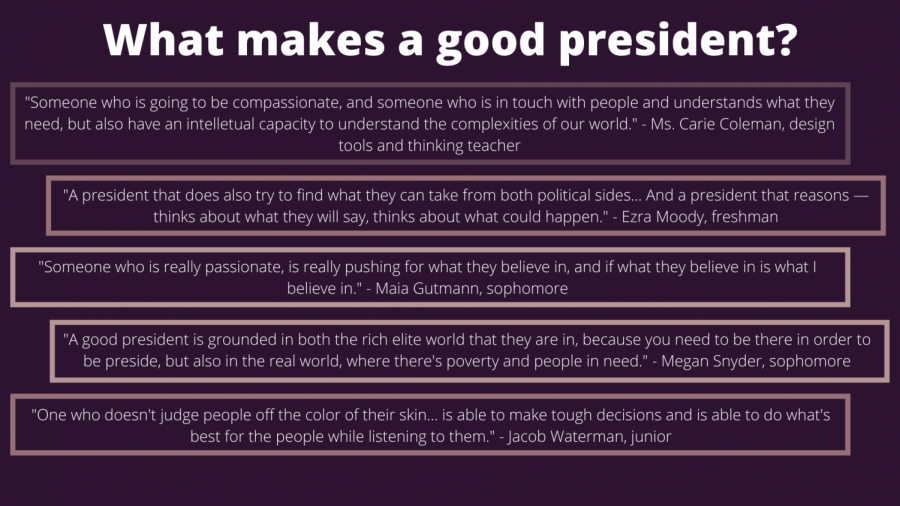
Though the second presidential debate was much more civil than the first, students saw examples of such “quips” during the first presidential debate, in which there were more interruptions than political debates have seen in the past.
Many students and staff tuned into the event. Perez described the debate as “silly,” and Marks-Bienen compared it to “toddlers bickering.”
Mr. Darmody said that he was “disappointed” by the lack of civility seen in the debate. “Particularly as a teacher and a parent, I would like to see a little more… decorum, I guess, or kind of structure followed,” he said. “We show each other more respect and listening and following of expectations in our classrooms than what I saw in a lot of those situations.”
Freshman Ezra Moody said that he found the debate “a bit childish.”
“There was no really respect in each other’s opinions,” Moody said. “Both of them kept bringing up bad topics of the past and throwing each other under the bus. I felt like they weren’t really seeing the essence of debating. Debating is more about reasoning, thinking about what the other’s opinion is, but also having a different outcome and debating more about what should happen… Constant interruptions can lead to more of an argument than an actual debate.”
Snyder also said that it seemed to be more of an argument, in which the opponents were throwing verbal punches at each other rather than addressing their own individual plans should they be elected.
“I thought it was just pretty aggressive,” she said. “Instead of answering the questions asked, I think both candidates kind of focused on each other more than the issues that they were supposed to be talking about.”
Several students and staff members said that one of their biggest concerns for the country at the moment is political division.
Junior Jacob Waterman said that “it seems like we’re on the breaking point of what seems like a race war, like another civil war in a sense,” he said. “It’s ridiculous.”
Several others feel that the two party system is creating high levels of contention and conflict.
“I definitely think America is becoming pretty much more divided than it ever has been,” Marks-Bienen said. “And I do wish that there were more actual prominent parties to vote for… I think people are just split right now, almost into Trump supporters and non-Trump supporters.”
Snyder said that one way that the two party system has been damaging is that some people’s “stance on things really depends on which party they’re in,” she said. “Sometimes just where they lie in their party affects which candidate they’re voting for. No matter what they do or say, they’ll still support the candidate in their party, just because that’s where they’ve always been, and I think people are afraid of changing their opinion.”
Moody also emphasized how the system has divided the country, describing the nation’s political state as a “tug of war” rather than dialogue and reasoning with others who support different ideas and opinions.
Like Snyder, Moody noticed how some people tend to vote for candidates simply based on which party they are in.
“Instead of just… voting for someone because of their political party,” Moody said, “vote for them because of what they’re saying… Instead of just saying, ‘oh, I’m voting for them because they’re a Democrat,’ or ‘because they’re a Republican,’ vote for them because they have good reasons.”
Design Thinking teacher Ms. Carie Coleman also expressed concern about the political divide, and the resulting judgment of others based on their political beliefs.
She said that she has noticed that when people encounter someone who holds opposite political ideologies, “automatically they’re viewed with contempt, that they’re not trustworthy, that there’s something wrong with them, because they don’t hold the same views as you,” she said. “That really bothers me, because as humans we’re really complex. And I think we’ve kind of tried to distill things down to, it’s black or white, yes or no… Our relationships are complicated, and it’s possible to hold two truths at one time.”
“How can we take one little part of their life in who they support politically, and have that override a whole wealth of information about who that person is?” Ms. Coleman said. “That’s one thing that concerns me the most, is that if you are on the other side, you’re the enemy. And that’s really hard, because we’re complex people and we’re loving people.”
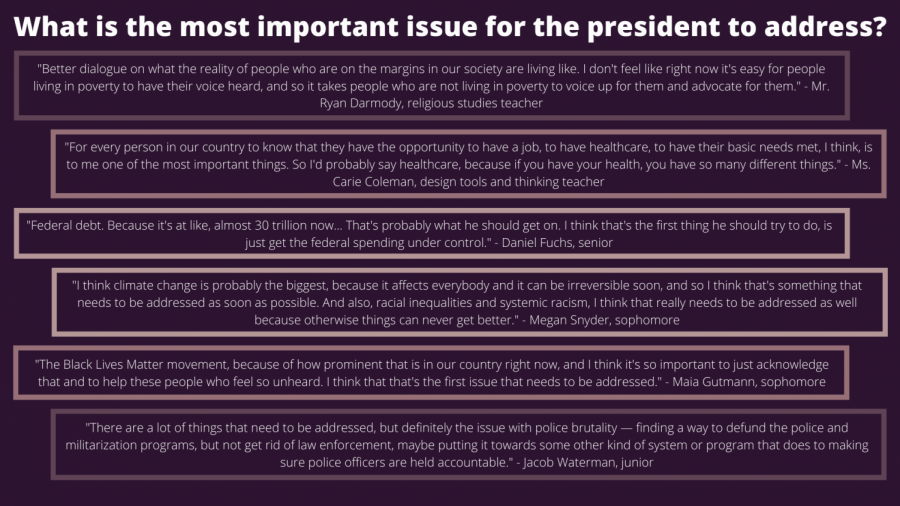
Though students and staff cited several different issues of concern for the country, when asked about areas in which they feel the country is doing well, some people struggled to find an answer.
“It’s kind of hard to pick positives now, isn’t it?” Ms. Hoemmen said. “Media kind of focuses on the negatives, so we don’t really have much positives to talk about because people just fight over and discuss what’s so bad.”
Fuchs said that to pinpoint a positive aspect of the country is “kind of a hard question, because it’s sort of a hard time. I don’t really know what is going well right now, per se.”
Marks-Bienen racked his brain for an answer for a moment, but eventually concluded that the area where he sees progression and positivity is how people are using their voices to speak out about their opinions.
“There are [positives]… it’s kind of hard to think of some,” Marks-Bienen said. “I mean, look at how much attention police brutality is getting. It’s unfortunate, of course, that it’s even an issue in the first place, but it is being talked about. So I think our country is at least trying to change the way members of our society think about race and think about gender, think about rights for women in the workplace, equal pay.”
Ms. Coleman said that she is also happy with the growing dialogue.
“I’ve never seen such a movement for rights of people in our country,” she said. “To me, that’s been a huge movement, and also the awareness of the effects of racism. It may not be agreed upon by everyone in our country, but I think as a whole, that’s a huge difference.”
Snyder noted how she has seen much more advocacy and awareness, especially on social media, and she said that this is “really good,” though “there’s still a lot more that needs to be done and action that needs to be taken.”
Waterman also said that he appreciates how people are increasingly speaking out.
“People are starting to share their voices [now more] than ever,” Waterman said. “Especially, white people on Black people’s issues — we’re getting more support than we have ever before.”
In addition to human rights movements, Mr. Darmody and Ms. Coleman both expressed that they are happy to see engagement with the election, especially from young people.
“If the electorate is more engaged, that hopefully means that we’re more engaged in working towards the betterment of our country and everyone’s experience in it,” Mr. Darmody said. “That doesn’t mean we’re all going to agree on stuff… but I’m really hopeful just by people’s excitement for voting and the movements we made towards getting more people to vote.”
Ms. Coleman said that she has talked to a few of her students about the election and the debates, and is pleased to see that even younger students stay connected to current events.
“Where students fall politically, that doesn’t matter to me,” Ms. Coleman said. “It matters that they’re engaged… I feel that younger students are more and more engaged than they have been in the past, and I think that’s a good thing.”
Ms. Hoemmen similarly said that it is important for young people to stay informed and engaged, even if they are not yet old enough to vote.
“It’s important… that you at least know what’s being talked about and what’s being discussed and what’s being promised right now for you for the next four years,” Ms. Hoemmen said. “Because that’s going to impact how you vote in the future… I think that’s an important thing just to be aware of that I wish I had been at your age.”
Marks-Bienen said that he thinks that because there is so much dialogue around this year’s election, young people who are currently under 18 years old will be more motivated to vote in the future.
“It’s talked about so much, and there’s just this angry divide between the two parties,” he said. “So I think it is a little harder to be oblivious at this point… Especially with social media, which just spreads things like wildfire, it’s definitely harder to be ignorant, it’s harder to be unaware of what’s going on.”
Perez, as a freshman, said that she thinks that the election affects young people and non-voters because they “hear [about] it all the time,” she said.
“It makes me think,” Perez said. “I have to be thinking about it, because next election, I am going to be able to vote. So it gets me thinking I need to start getting kind of involved in this.”
Gutmann said that one major way that the election impacts young people is its relation to climate change.
“If we don’t take action, we won’t have a planet that’s livable in our future and for our kids and our grandkids,” she said.
“And then in addition to that… the people in power, the most important people in our country, is who so many people look up to,” Gutmann said. “If Trump is technically the most important person in America, if all of these young kids who have such impressionable minds are seeing him… saying ‘climate change isn’t real, you don’t need to wear a mask,’ if that is what we are seeing, that could leave a serious imprint on these people who are still learning.”
Several individuals emphasized the importance of voting now and in the future, emphasizing its importance to the democratic process.
“No matter the outcome of the election, I hope that nobody is disheartened in the process of voting,” Mr. Darmody said. “I hope that people are not disheartened if their candidate doesn’t win or something like that, or they’re disappointed by the voting, it doesn’t mean [you shouldn’t] vote.”
Fuchs, who has recently turned 18 and is turning in a ballot for the first time, also emphasized the significance of voting.
“I think everyone should go out and vote, regardless of whether you like the candidates or not,” Fuchs said. “I think it’s a civic duty, and it’s important to the system.”


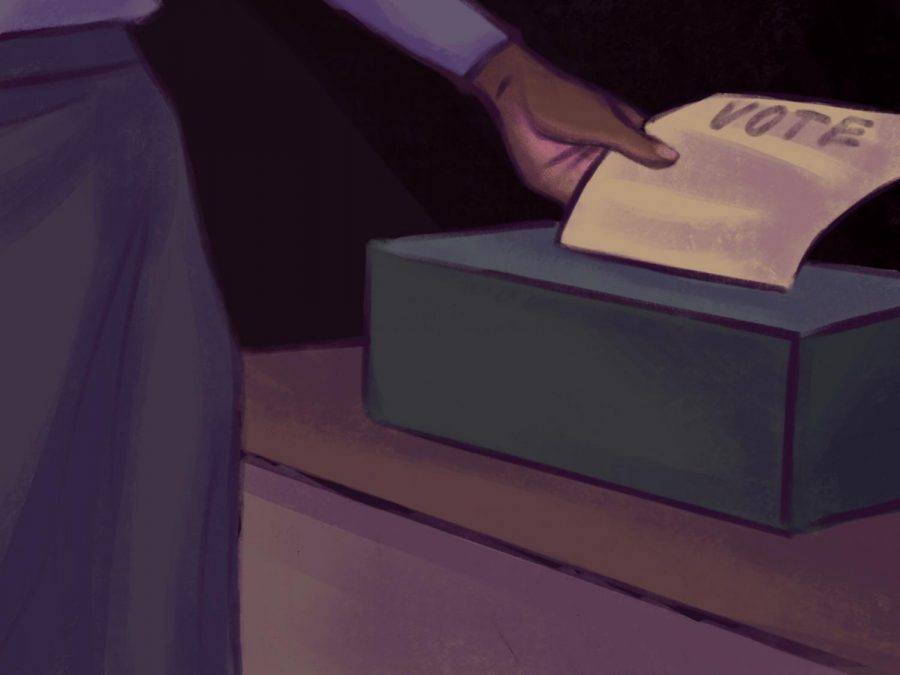
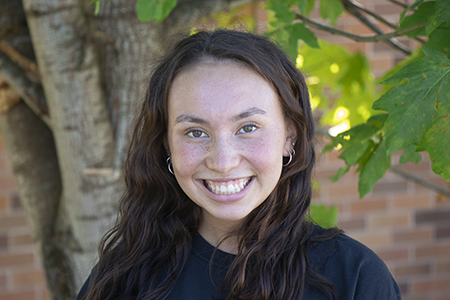



Shak Saidjanov • Nov 13, 2020 at 12:51 am
I opened this article with the preconceived notion that I would find a certain narrative or bias but I found none, which is refreshing. Or maybe I mean relieving. In a nation where the youth are trusted with the ballot before they are even trusted with beer I think articles like this one, written by the youth, can have the power of tending the bipartisan light at the end of the tunnel, in a way. And it also suggests that there’s no need for frantic preservation of the American dream, not when we have students that are informed. Thanks for the super cool piece